

When lectures fall short as a teaching tool (essay) My children and parents were in bed before 10 p.m. one night over the holidays.
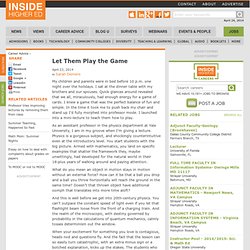
I sat at the dinner table with my brothers and our spouses. Quick glances around revealed that we all, miraculously, had enough energy for a game of cards. I knew a game that was the perfect balance of fun and simple. In the time it took me to push back my chair and stand up I’d fully morphed into professor mode. I launched into a mini-lecture to teach them how to play. As an assistant professor in the physics department at Yale University, I am in my groove when I’m giving a lecture. Dominican University Study Reveals Students Learn Just As Much From Open-Book Tests. A study conducted by two associate professors of psychology at Dominican University of California in San Rafael indicates that students may learn just as much from open-book exams as they do from closed-book tests, while experiencing less anxiety.
The results of the study have been published in the current issue of the journal "Psychology Research. " Students boycott final to challenge professor's grading policy (and get As) Since he started teaching at Johns Hopkins University in 2005, Professor Peter Fröhlich has maintained a grading curve in which each class’s highest grade on the final counts as an A, with all other scores adjusted accordingly.
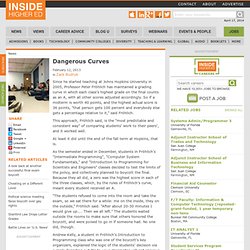
So if a midterm is worth 40 points, and the highest actual score is 36 points, "that person gets 100 percent and everybody else gets a percentage relative to it,” said Fröhlich. This approach, Fröhlich said, is the "most predictable and consistent way" of comparing students' work to their peers', and it worked well. What’s the Difference Between “Doing Projects” and “Project Based Learning”? Multiple Choice Exam Theory (Just In Time For The New Term) [This is a guest post by Jonathan Sterne, an associate professor in the Department of Art History and Communication Studies at McGill University.
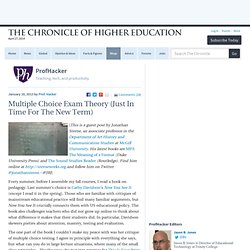
His latest books are MP3: The Meaning of a Format (Duke University Press) and The Sound Studies Reader (Routledge). It's Me Against My Students - Do Your Job Better. Grades Out, Badges In - College, Reinvented. Essay on what the political campaign shows about the need for critical thinking. Everyone applauds the idea of critical thinking, and liberal arts colleges often make their ability to teach critical thinking a key selling point.
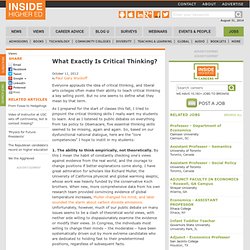
But no one seems to define what they mean by that term. As I prepared for the start of classes this fall, I tried to pinpoint the critical thinking skills I really want my students to learn. And as I listened to public debates on everything from tax policy to Obamacare, five essential thinking skills seemed to be missing, again and again. So, based on our dysfunctional national dialogue, here are the "core competencies" I hope to instill in my students: 1. 2. The Benefits of Making It Harder to Learn - Do Your Job Better. By James M.
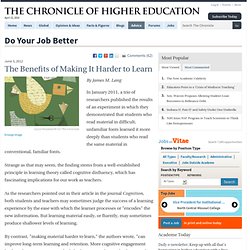
Lang In January 2011, a trio of researchers published the results of an experiment in which they demonstrated that students who read material in difficult, unfamiliar fonts learned it more deeply than students who read the same material in conventional, familiar fonts. Strange as that may seem, the finding stems from a well-established principle in learning theory called cognitive disfluency, which has fascinating implications for our work as teachers.
As the researchers pointed out in their article in the journal Cognition, both students and teachers may sometimes judge the success of a learning experience by the ease with which the learner processes or "encodes" the new information. Thinking Differently About Technology. Paradigm Shift How long has the word paradigm been around?
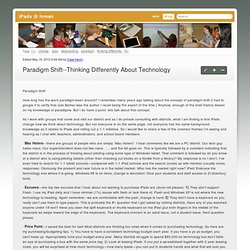
I remember many years ago talking about the concept of paradigm shift (I had to google it to verify that Joel Barker was the author I recall being the expert of the time.) Anyhow, enough of the brief history lesson on my knowledge of paradigms. The “Flipped Classroom” starts with one question: what is the best use of my face-to-face class time? May 22, 2012 If you’ve implemented (or even heard of) the flipped classroom approach to teaching, you have Jonathan Bergmann to thank.
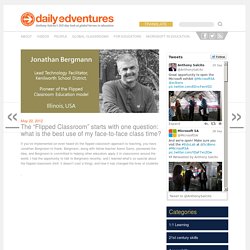
Bergmann, along with fellow teacher Aaron Sams, pioneered the idea, and Bergmann is committed to helping other educators apply it in classrooms around the world. What Really Matters to Working Students - Do Your Job Better. By Brian P.
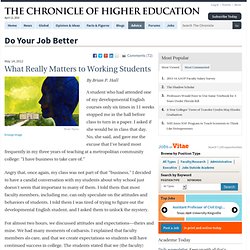
Hall. Reclaiming the Classroom With Old-Fashioned Teaching - The Digital Campus. By Jennifer Brannock Cox When we professors were students, we were all guilty of being off task from time to time during a class.
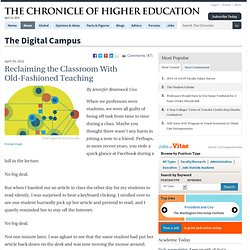
Maybe you thought there wasn't any harm in jotting a note to a friend. Perhaps, in more recent years, you stole a quick glance at Facebook during a lull in the lecture. No big deal. 6 Tips to Leading a Training (They'll Actually Enjoy) Stop Telling Students to Study for Exams - Commentary. By David Jaffee Among the problems on college campuses today are that students study for exams and faculty encourage them to do so.
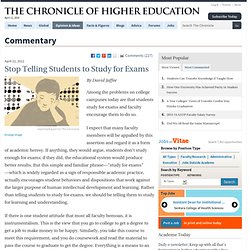
I expect that many faculty members will be appalled by this assertion and regard it as a form of academic heresy. If anything, they would argue, students don't study enough for exams; if they did, the educational system would produce better results. But this simple and familiar phrase—"study for exams"—which is widely regarded as a sign of responsible academic practice, actually encourages student behaviors and dispositions that work against the larger purpose of human intellectual development and learning. Rather than telling students to study for exams, we should be telling them to study for learning and understanding.